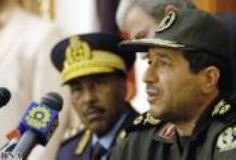Sudan’s defence minister slams UK Blair over Darfur comment
March 16, 2007 (KHARTOUM) — Sudan’s defence minister has blasted British Prime Minister for calling to adopt tougher line against Sudanese government over Darfur atrocities to prevent extremism spreading across Africa.
 The minister of defence, Lt-Gen Abdelrahim Mohamed Hussein, has strongly rejected statements by the British Prime Minister, Tony Blair, in which he said the struggle in Darfur should be seen as part of the international war on terror and extremists.
The minister of defence, Lt-Gen Abdelrahim Mohamed Hussein, has strongly rejected statements by the British Prime Minister, Tony Blair, in which he said the struggle in Darfur should be seen as part of the international war on terror and extremists.
Blair’s comments came after Sudanese President Omar al-Bashir last week backed away from a deal reached on November 16 last year in Addis Ababa to allow a 20,000-strong UN peacekeeping force into Darfur to support African Union peacekeepers troops.
Hussein said the government stood by its position against international forces entering the region because their agenda would not lead to peace, reported the Arabic language Al-Sahafa.
He said that Blair’s statements regarding terrorism in Darfur were lies and fabrications. He said this was another type of Western pressure to enforce Resolution 1706 which has always been rejected by the government.
“They lied before in Iraq and claimed there were weapons of mass destruction but these were never found,” Hussein said. He further added, “They want to repeat the same scenario in Darfur.”
He stressed that the government would not allow this. “There is neither terrorism nor terrorists in Darfur, because the people of the region know each other and any foreign entity in the region would be obvious to everyone,” he pointed out. “We do not want Darfur to become another Iraq with international troops getting involved,” he said.
The defence minister went on the question how if 160,000 troops had failed to bring about security in Iraq then how could 22,000 soldiers enforce it in Darfur which is three times the size of Iraq? He said the total of victims of incidents in one year in Darfur were the equivalent to the total of victims in one week in Iraq.
“If we carry on apologising for ourselves leaving them the excuse of saying, it’s because of George Bush that they’re doing these terrible things or ridiculous nonsense like that, the more we give in to their propaganda and ideas the less chance we have of protecting our security.” said the British Prime Minister.
Hussein said he had witnessed a noticeable improvement in Darfur since the beginning of the year, and that there had been no confrontations between the armed forces and rebels. He said he considered occasional clashes which occurred as being merely the result of tribal friction which state authorities quickly contained through tribal reconciliations. Hussein further stressed that internally displaced persons camps in Darfur were calm.
“If the international community is keen on peace in Darfur, then it should act on the limited responsibilities set out for it by the Abuja agreement. It should also act on its statements about taking punitive measures against rebel movements that refused to sign the peace agreement,” Hussein said, adding “Where are those punitive measures they spoke about?”
He said that in the same way donors had honoured their pledges to provide money for peace in the south, they should also honour their pledges to Darfur. “On the contrary, they have provided a safe haven for the rebels and have facilitated their movement in Darfur.”
Hussein reiterated that the country’s sovereignty and its security were the government’s responsibility and pointed out that the government would not concede these through accepting international agendas which would open up the country for foreign police and judiciary to enforce certain countries’ agendas.
The conflict erupted in 2003 when ethnic minority rebels rose up against the Islamist-dominated regime in Khartoum drawing a scorched earth response from the military and allied militias.
At least 200,000 people have since died and more than two million more fled their homes, according to the United Nations officials.
(ST)
